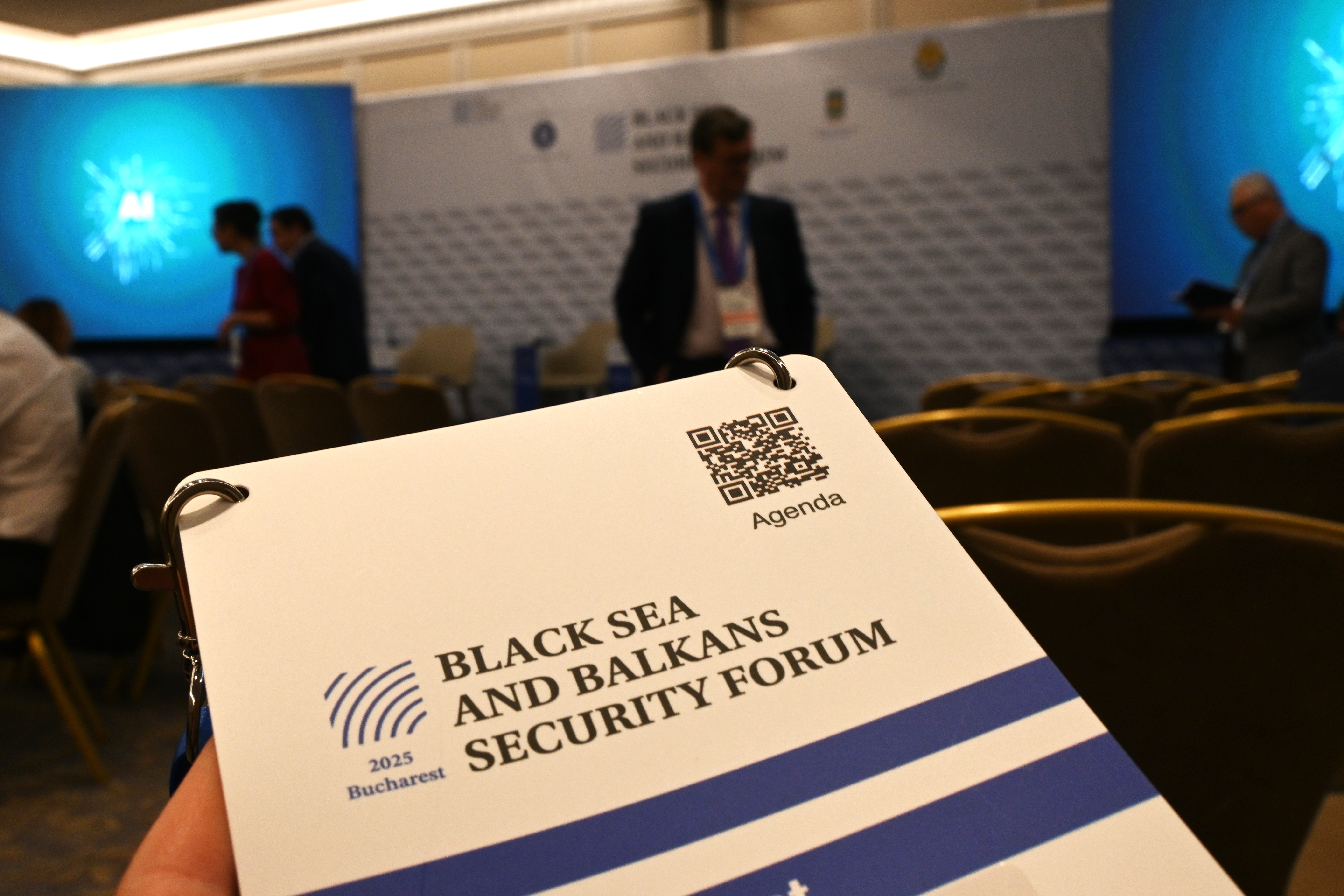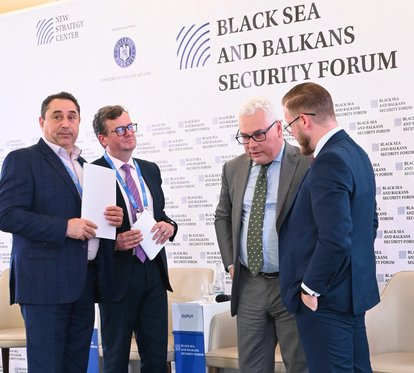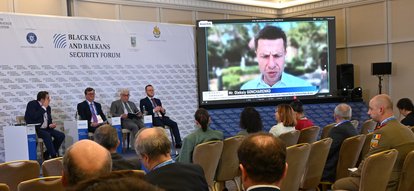Hybrid Warfare
Weaponization of Migration: A New Face of Russian Hybrid Warfare

Black Sea and Balkans Security Forum 2025 - Bucharest, Romania
Reaching its ninth edition in May 2025, the Black Sea and Balkans Security Forum has established itself as a premier regional platform for high-level dialogue on the security challenges facing Eastern Europe and its neighbours. Organised by the New Strategy Centre think tank in partnership with the Romanian Ministry of Defence, the 2025 Forum was held in Bucharest, bringing together policymakers, experts and civil society leaders to discuss the most urgent security issues.
This year, the Friedrich Naumann Foundation for Freedom (FNF) Romania hosted for the second time in sequence a pivotal panel: “Weaponization of Migration. A New Face of Russian Hybrid Warfare.” The event, held in collaboration with the Institute for Freedom and Democracy, Romania, brought together distinguished speakers to analyze how migration is being manipulated as a geopolitical weapon, particularly in the context of Russia’s ongoing war against Ukraine.

From left to right: Mr. Cristian David, Chairman of the Institute for Freedom and Democracy, Member of the Romanian Consultative Council for Sustainable Development, and Adviser at the European Parliament (moderator); Mr. Raimar Wagner, Friedrich Naumann Foundation, Romania and Moldova; Mr. Emmanuel Dupuy, President, Institute for European Perspective and Security, France; and Mr. Aleksander Olech, Head of International Cooperation, Defence24, Poland.
Panel Overview and Key Themes
Chaired by Cristian David, President of the Institute for Freedom and Democracy, the panel featured contributions from Oleksiy Goncharenko (President of the PACE Committee on Migration, Refugees and Internally Displaced Persons, Verkhovna Rada, Ukraine), Emmanuel Dupuy (President, Institute for European Perspective and Security, France), Aleksander Olech (Head of International Cooperation, Defence24, Poland), and Raimar Wagner (Project Director, FNF Romania and Moldova).
Cristian David opened the discussion by underscoring the scale of displacement caused by Russia’s invasion of Ukraine: 13 million Ukrainian persons have been displaced in context of the aggression war of Russia in Ukraine, out of which 3,7 million remain internally displaced within Ukraine. This constitutes the largest displacement crisis in Europe since World War II, with children and women making up 75% of those affected.
Weaponization of Migration: Strategies and Impacts
Oleksiy Goncharenko, joining online, sharply criticized Russia for its blatant violations of human rights and international law, emphasizing how the Kremlin’s aggression has triggered a humanitarian catastrophe. He drew attention to the deliberate use of migrants as tools of hybrid warfare, particularly by Russia and Belarus, who have facilitated the movement of people from the Middle East and other regions toward EU borders, especially those of Lithuania, Poland, and Finland. This orchestrated migration flow aims to destabilize the EU and NATO by overwhelming border security, creating humanitarian crises, and pressuring for political concessions. Goncharenko called for legislative and policy measures that protect both migrants and host societies, and for sustained support in rebuilding Ukraine and supporting returning refugees.
Raimar Wagner’s intervention focused on the German experience, highlighting that migration is no longer merely a humanitarian or social issue, but a geopolitical instrument deliberately exploited by state actors like Russia. He described Russia’s “playbook” as one of provocation and disinformation: facilitating migration flows and amplifying incidents—real or fabricated—through state media to fuel outrage and erode trust in institutions. Wagner argued that the real weapon is not the migrants themselves, but the societal reaction and division provoked within European societies.
Germany’s approach is grounded in human rights, the rule of law, and a commitment to integration and social cohesion. The SVR (Expert Council on Integration and Migration) recommendations for 2025–2029 call for effective migration management, combating discrimination, investing in education and labor market inclusion, and supporting municipalities with infrastructure—while also emphasizing the need for narrative counteroffensives and strategic communication to counter disinformation.
Wagner highlighted Germany’s advocacy for coordinated responses at the NATO and EU levels, including enhanced border intelligence, joint resilience strategies, and legal harmonization to prevent “asylum shopping.” The German message is clear: the threat is not the scale of migration, but the manipulation of societal responses and the erosion of democratic values.

Mr. Oleksiy Goncharenko, President of the PACE Committee on Migration, Refugees and Internally Displaced Persons, Verkhovna Rada, Ukraine participated via VTC.
Regional and European Perspectives
Aleksander Olech provided a Polish perspective, noting that Poland has become a frontline state, hosting over 1.5 million Ukrainian refugees. He emphasized that robust border protection, humanitarian assistance, and effective integration policies are essential to maintain social cohesion and address security concerns. Olech warned that migration crises, when manipulated by external actors, can fuel political polarization and extremist narratives. He called for coordinated European responses that combine humanitarian values with robust security measures.
Emmanuel Dupuy, representing the French perspective, cautioned against conflating migration with terrorism, noting that most migrants are not involved in such activities and that such narratives can feed xenophobia and undermine effective policy. He highlighted the diversity of migration challenges across Europe, arguing for tailored, context-specific solutions. Dupuy stressed that successful integration is key, requiring early intervention, public diplomacy, and education to help migrants adapt and respect the values of host societies.
Conclusion
The panel at the Black Sea and Balkans Security Forum, hosted by FNF Romania, highlighted the complex and evolving challenge of migration as a tool of hybrid warfare. The consensus among speakers was clear: while migration itself is not a threat, its deliberate manipulation by hostile actors poses significant risks to European security, social cohesion, and democratic values. Addressing this challenge requires a coordinated, values-driven response that balances humanitarian commitments with resilience against hybrid threats. The Forum’s discussions underscored the need for solidarity, strategic communication, and comprehensive integration policies to safeguard both migrants and the societies that receive them.
